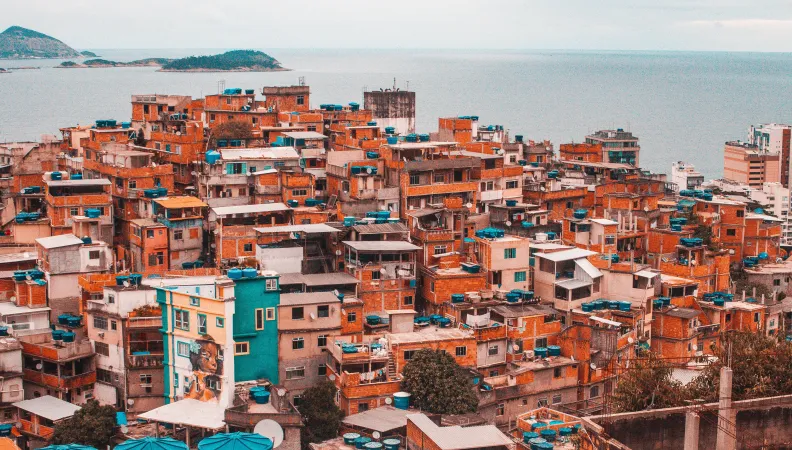 This research project focused on collective arrangements for access to land and housing in developing cities that are linked with the concept of commons. It studied the implementation of some collective forms of land use in developing cities and their effects, particularly in terms of access to land and housing, reduction of urban inequalities and social inclusion.
This research project focused on collective arrangements for access to land and housing in developing cities that are linked with the concept of commons. It studied the implementation of some collective forms of land use in developing cities and their effects, particularly in terms of access to land and housing, reduction of urban inequalities and social inclusion.
Context
Despite a renewed interest for the notion of “commons” within the academic world, little work has been done about land and housing issues in cities of the Global South.
Yet access to urban land is a major issue for dwellers of these rapidly growing cities and a determining factor for the improvement of their living conditions and for their access to “adequate housing”, according to UN terminology. The mainstream approach to urban land tenure, based on full individual private ownership and the free market, generates speculation and land grabbing, and exclusion of the most precarious households.
The critical dimension of the commons notion opens up innovative ways to produce housing in the Global South, according to plural perspectives that take into consideration the inhabitant’s needs and their agency abilities.
Goal
This research project aimed to highlight the diversity of hybrid, permeable, evolving commons within space and time. These commons aim at getting and securing access rights to land and housing and associated services, which often arise from unexpected opportunities.
The research team looked at innovative ways of holding land: commonly held, with a housing function and in a nonspeculative perspective (when the transfer of land is carried out according to a framework decided beforehand by a community, without any capital benefit).
Method
The methodology was based on case studies in developing cities:
- The first phase of the study (2017-2018) led to three field surveys in Burkina Faso, Kenya and India.
- The second phase (2018-2020) consisted of two additional field surveys (Brazil, Mexico), as well as the follow-up of the work carried out in New Caledonia by students in the framework of the School of Urban Affairs (Master’s Degree « Urban Planning Cycle») of Sciences Po Paris.
The team consisted of:
- An academic with authorization to supervise research (HDR), who directed the study;
- A research engineer, who provided the scientific coordination of the study;
- Local researchers specialising in land and urban issues in survey countries.
The study consisted of five phases: documentary research, field research, data processing, drafting of deliverables, valorisation of research findings.
Results
This research project resulted in the publication of several research papers:
- “Land-based commons for inclusive cities” (available in French): this research paper presents the conclusions of 8 case studies, focused on securing popular habitat through shared ownership of the land.
- “Does Mexico’s social land still bear commons?” (available in French): Mexican common land has undergone major transformations since the 1990s. This research paper presents the study on the outskirts of the metropolitan area of Mexico City led by the students of the Urban Planning Programme of Sciences Po Paris, under the supervision of Jean-François Valette.
- “Regularizing Rio favelas through land pooling?”: the paper sheds light on an original system of collective land regularization in precarious neighborhoods, which puts into practice the notion of “plural property” running through Brazilian law, and which defends the right of the inhabitants to remain in place.
- “User cooperatives in Uruguay: the challenge of housing as common” (available in Spanish)
The final report of the research project on urban land-based commons for housing in the Global South can be downloaded here.
All the publications and events related to the research project are listed on the following website: Communs fonciers pour l’habitat – Quelle contribution à l’inclusion urbaine dans les Suds ? (hypotheses.org)
Lessons learned
"The commons can be understood as a social policy of housing, offering access to housing to the most vulnerable social categories. Moreover, they can provide an alternative path to classical public housing policies which favor individual private property. Indeed, even though these initiatives emerge from dwellers organizations, they might be supported and framed by national governments. Often acknowledged, supported and even presented as standard to be followed, the commons have drawn increased attention recently from dwellers federations, associations, NGOs and international institutions that document their functioning and contribute to the international circulation of these alternative ideas." (Simonneau & Denis, 2021)
Contacts:
- Claire Simonneau, professor and researcher at Université Gustave Eiffel and researcher at the Laboratoire Techniques, territoires et sociétés (LATTS)
- Stéphanie Leyronas, research officier at AFD
 Digital technology has gained a major place in development strategies in sub-Saharan Africa. Entrepreneurship as a common is a phenomenon of scale but that is still little known. The study made it possible to map its various forms and analyze the communities mobilized, the underlying economic models and the social issues they address.
Digital technology has gained a major place in development strategies in sub-Saharan Africa. Entrepreneurship as a common is a phenomenon of scale but that is still little known. The study made it possible to map its various forms and analyze the communities mobilized, the underlying economic models and the social issues they address.
Context
As part of its Digital Transition strategy (2021-2025), AFD has made three commitments:
- Offer everyone access to the Internet and its services;
- Put online essential services for each strategic transition;
- Putting the creation of innovative companies at the service of development.
In response, one of the three identified levers is to foster the governance of digital resources in the form of “common”. Digital commons refer to communities of rights holders who create and maintain, on a collaborative basis, databases, computer codes, digital tools, shared knowledge, literary and artistic creations. What we mean by “sub-Saharan African commons” refers to digital resources whose user or contributor communities are located in sub-Saharan Africa.
This research project is part of AFD’s “Commons” research signature programme.
Goal
The aim of the study was to identify the digital commons in sub-Saharan Africa, so as to produce a representative – if not exhaustive – map. The objective was to report on the extent of the phenomenon of digital commons in sub-Saharan Africa, by distinctly analyzing common content, data, software and common hardware shared or open plans and designs. It analysed how digital commons contribute to the achievement of the Sustainable Development Goals (SDGs) and the challenges they face.
The service also analysed in more depth a selection of ten commons (African Storybook; AfricArXiv; AFRINIC; Energypedia; Grassroots Economics; Open MRS; Pamoja-Net; Ushahidi; WaziHub; Wikimedia Côte d'Ivoire), chosen for their representative nature, and proposed avenues for support by AFD.
Finally, the objective of the service was to create a community of interest around these issues through a collaborative approach.
Method
The study was carried out in three phases:
- Collecting digital commons experiences in sub-Saharan Africa through a launch webinar and a collaborative platform;
- Research and census of digital commons at work or mobilized in sub-Saharan Africa through survey work. The research method used was mainly qualitative, through semi-directive interviews with identified African partners: common bearers, contributors, users and facilitators (public actors, private actors). Ten experiments were the subject of more in-depth analyses according to a defined maintenance framework.
- Presentation of research findings.
Results
The study led to three main results:
- Production of an illustrated mapping and a proposal for taxonomy of digital commons in sub-Saharan Africa, following a literature search, workshops and interviews. It identifies 89 examples of digital commons with communities in sub-Saharan Africa. This collaborative mapping is available online (in French).
- Construction of a community (researchers, practitioners of the commons, institutional) interested in this subject, through the establishment of a collaborative approach.
- Analysis of illustrative cases of issues related to commons and opportunities for AFD to support them. These analyses gave rise to ten descriptive sheets of these commons.
Find out more about digital commons in Africa in the dedicated chapter of The Commons. Drivers of change and opportunities for Africa.
Lessons learned
Five working hypotheses have been formulated:
- Hypothesis 1: African communities are very diverse and rarely identify themselves as commons.
- Hypothesis 2: Sub-Saharan African communities that participate in the development of commons are based first of all on a few committed citizens.
- Hypothesis 3: The sustainability of the identified commons depends heavily on their ability to mobilize international support.
- Hypothesis 4: The positive impact of access to global digital commons in sub-Saharan Africa is increasingly recognised.
- Hypothesis 5: The digital commons of sub-Saharan Africa participate in citizen struggles to decolonize knowledge and culture and support the local creation of value.
Read also: Digital Commons and Entrepreneurship: Alternative or Complementary Approaches?
Contacts:
- Stéphanie Leyronas, research officer at AFD
- Jan Krewer, independent consultant
